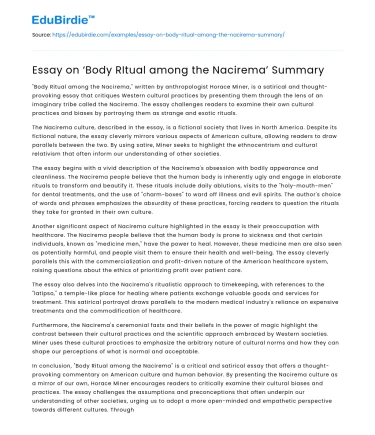"Body Ritual among the Nacirema," written by anthropologist Horace Miner, is a satirical and thought-provoking essay that critiques Western cultural practices by presenting them through the lens of an imaginary tribe called the Nacirema. The essay challenges readers to examine their own cultural practices and biases by portraying them as strange and exotic rituals.
The Nacirema culture, described in the essay, is a fictional society that lives in North America. Despite its fictional nature, the essay cleverly mirrors various aspects of American culture, allowing readers to draw parallels between the two. By using satire, Miner seeks to highlight the ethnocentrism and cultural relativism that often inform our understanding of other societies.
Save your time!
We can take care of your essay
- Proper editing and formatting
- Free revision, title page, and bibliography
- Flexible prices and money-back guarantee
The essay begins with a vivid description of the Nacirema's obsession with bodily appearance and cleanliness. The Nacirema people believe that the human body is inherently ugly and engage in elaborate rituals to transform and beautify it. These rituals include daily ablutions, visits to the "holy-mouth-men" for dental treatments, and the use of "charm-boxes" to ward off illness and evil spirits. The author's choice of words and phrases emphasizes the absurdity of these practices, forcing readers to question the rituals they take for granted in their own culture.
Another significant aspect of Nacirema culture highlighted in the essay is their preoccupation with healthcare. The Nacirema people believe that the human body is prone to sickness and that certain individuals, known as "medicine men," have the power to heal. However, these medicine men are also seen as potentially harmful, and people visit them to ensure their health and well-being. The essay cleverly parallels this with the commercialization and profit-driven nature of the American healthcare system, raising questions about the ethics of prioritizing profit over patient care.
The essay also delves into the Nacirema's ritualistic approach to timekeeping, with references to the "latipso," a temple-like place for healing where patients exchange valuable goods and services for treatment. This satirical portrayal draws parallels to the modern medical industry's reliance on expensive treatments and the commodification of healthcare.
Furthermore, the Nacirema's ceremonial fasts and their beliefs in the power of magic highlight the contrast between their cultural practices and the scientific approach embraced by Western societies. Miner uses these cultural practices to emphasize the arbitrary nature of cultural norms and how they can shape our perceptions of what is normal and acceptable.
In conclusion, "Body Ritual among the Nacirema" is a critical and satirical essay that offers a thought-provoking commentary on American culture and human behavior. By presenting the Nacirema culture as a mirror of our own, Horace Miner encourages readers to critically examine their cultural biases and practices. The essay challenges the assumptions and preconceptions that often underpin our understanding of other societies, urging us to adopt a more open-minded and empathetic perspective towards different cultures. Through humor and satire, Miner exposes the complexity and subjectivity of cultural practices, prompting us to question the rituals and beliefs we consider normal and take for granted in our own lives. Overall, "Body Ritual among the Nacirema" serves as a powerful reminder of the importance of cultural relativism and the need to approach other cultures with humility and curiosity.






 Stuck on your essay?
Stuck on your essay?

